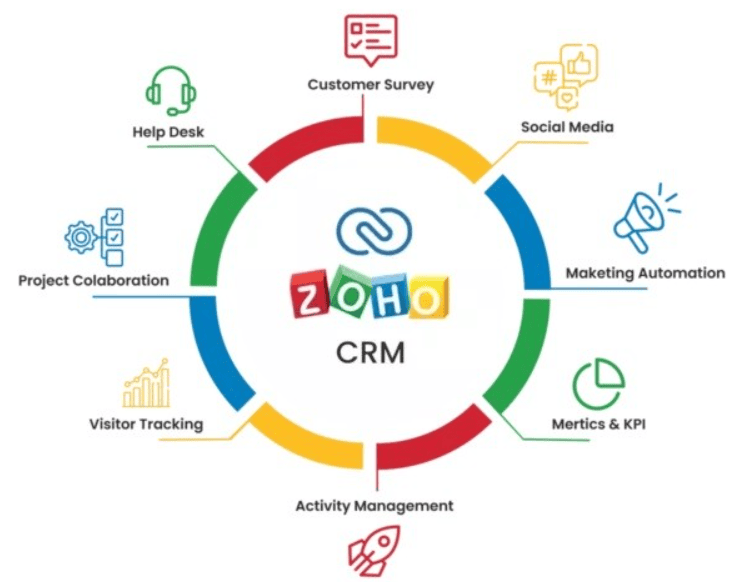
Automation plays a critical role in streamlining operations, reducing human error, and enabling businesses to focus on strategic initiatives. Traditional workflows, often manual and time-consuming, hinder productivity and affect overall performance. With automation, organizations can minimize redundancies, ensure consistency, and drive efficiency. Zoho provides businesses with various automation tools tailored for client engagement, business processes and data-driven decision-making. These tools help companies scale efficiently, making them more agile and competitive in their respective industries.
The need to automate business processes
In our daily lives, we rely on various tools and technologies to save time and make things easier. Whether we're using a washing machine for laundry or taking an Uber to work, these conveniences help us manage our time better.
Similarly, it's crucial to ensure that businesses leverage technology to achieve their goals. Incorporating business process automation empowers companies to do more with less by automating their workflows.
Gartner reports that inefficiencies can cost companies up to 30% of their revenue annually, so addressing them through automation is crucial to avoiding task stagnation.
But automating business processes at an organization can do more than save time—it goes beyond simply eliminating off-the-shelf software to streamline operations.
The difference between Business Process Automation and Business Process Management?
Business process automation is often confused with business process management (BPM). While both complement each other, they aren't the same. BPA mainly focuses on automating repetitive processes and workflows using BPA software/tools within an organization. BPM, on the other hand, focuses on managing, designing, executing, monitoring, and optimizing end-to-end business processes, with or without the usage of advanced technologies. It covers a broader spectrum, with BPA being a subset of BPM in many cases but not always.

Key Business Areas Transformed by Zoho Automation
Key Business Areas Transformed by Zoho Automation
1. Client Relationship Management (CRM) Automation
Zoho CRM automates sales pipelines, customer follow-ups, and engagement strategies. With AI-driven insights and automated workflows, businesses can enhance lead conversion rates and strengthen customer relationships.
2. Workflow Automation for Business Operations
Zoho Creator and Zoho Flow empower businesses to automate complex workflows across multiple applications. By integrating these tools, companies can eliminate manual intervention in repetitive tasks and streamline approvals, notifications, and process hand-offs.
3. Marketing and Campaign Management
Zoho Campaigns and Zoho Social enable businesses to automate email marketing, social media posting, and audience segmentation. Businesses can leverage automation to personalize communication, schedule campaigns in advance, and analyze audience engagement for better targeting.
4. Finance and Accounting Automation
Zoho Books and Zoho Expense simplify financial tracking, automate invoice generation, and ensure seamless tax compliance. Automated reporting and real-time financial insights help businesses maintain accurate financial records and make data-backed decisions.
5. Human Resources and Employee Management
Zoho People automates employee onboarding, performance tracking, and leave management. HR teams can streamline hiring processes, manage payroll, and ensure compliance through automated workflows.
6. Data Analytics and Reporting
Zoho Analytics provides businesses with automated data collection, real-time dashboards, and advanced analytics. By consolidating data from various sources, businesses can make informed strategic decisions and gain a competitive edge.
Implementing Zoho Automation for Maximum Impact
To fully leverage automation with Zoho, businesses must:
Identify Automation Opportunities: Evaluate existing workflows to determine which processes can be automated for maximum efficiency.
Integrate Zoho Applications: Utilize Zoho’s interconnected ecosystem to ensure seamless data flow across departments.
Customize Automation Workflows: Tailor Zoho’s automation tools to meet specific business needs, ensuring a personalized approach.
Continuously Optimize and Scale: Regularly assess the performance of automation strategies and make adjustments for improved efficiency.
Automation is the key to business growth and sustainability. By leveraging Zoho’s extensive suite of digital solutions, businesses can streamline operations, enhance customer experiences, and drive long-term success. Organizations that prioritize automation gain a competitive advantage, positioning themselves for scalability and innovation in an ever-evolving marketplace.

